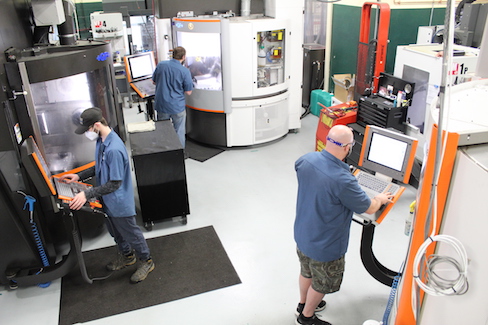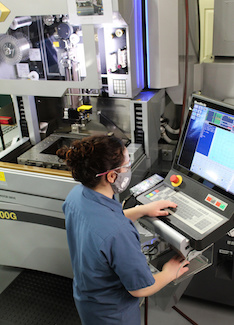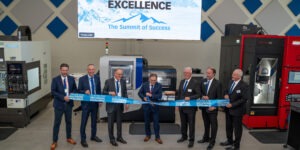By Doubling Down on People, Mold Maker Doubles Down on Sales
Connecticut mold maker Ray Coombs put capital investment on hold for five years to work with the local educational and manufacturing communities to solve his labor problems once and for all. Then he added three new machines that are helping to cross-train employees for record sales.
Posted: February 15, 2021
EDITOR’S FORUM
BY STEPHANIE JOHNSTON
It’s not surprising the pandemic has been a source of growth for metal manufacturers who serve the medical industry. And that’s true of Westminster Tool Inc. in Plainfield, Conn. However, had the company not committed to cross-training employees to operate different types of machines, it wouldn’t have had the resources to buy more machines that have increased milling capacity by 400%. Nor would it have managed to maintain employment levels over the last five years and not institute pay cuts or furloughs in 2020.
Training is one of those things everyone believes in but can’t quite get around to. While running all your equipment 24/7 is great for the bottom line, it’s hard to summon the mental energy to develop and implement an effective program when you’re focused on getting more high-quality product than ever before on tighter deadlines than ever before out the door. And, of course, you don’t have machine on which to train operators.
Again, Westminster was no different than many manufacturers. Ultimately, the company partnered with the local educational and manufacturing communities to develop a home-grown solution for recruiting and retaining skilled labor. After that, the next logical step was to maximize that investment by diversifying employees’ skill sets.
Building Your Own Solution
Like manufacturers across the country, hiring experienced mold makers was an exercise in futility. Seven years ago, Westminster spent $15,000 over nine months on help-wanted ads that produced four responses. Two applicants were retired and looking for part-time work. Another decided Connecticut’s cost of living is too high.
Enough was enough for President Ray Coombs, who was desperately trying to satisfy customers’ shortening lead times. He’d started the company in his basement in 1997, moved into factory space six years later, and had expanded into composite tooling and high-performance aerospace components. But in 2013, he temporarily paused growth plans to solve his labor issue once and for all.
“We realized that if we were going to sustain our business, we needed to establish a way to grow the next generation of manufacturers,” he says.
He put capital investments on hold for five years to focus on human capital.
Westminster Academy was created to ensure every employee knows how to do at least one other job. Accessible via the company’s intranet, the academy documents all the skills and experience needed to perform a specific role and tracks proficiency progress over time.
New hires use it to onboard, and employees cross train from tool making to mold making. Apprentices from Quinebaug Valley Community College, which established an Advanced Manufacturing Certificate program in 2012, use it to develop and document a personal training program after being paired with a senior member of the manufacturing team via the company’s coach-and-player mentoring model.
And an interesting thing happened: The average age of employees fell from over 50 to 33. Tooling sales nearly doubled and efficiencies dramatically increased.
Which Brings Us to 2021
“A culture focused on cross-training is never easy,” says Coombs. “It takes time, money, and patience; but it’s the foundation for our success today.”
He’s referring to the recent acquisition of three new pieces of equipment. They include a 5-axis GF Machining Solutions Mikron HSM_400U LP with automated pallet handling that will enable the milling machine to run almost entirely unattended. That, along with one additional 3-axis Mikron HSM500 MoldMaster, is driving the huge increase in milling capacity.
“The goal was to increase throughput by reducing overall lead time, but they’re making a positive impact in other ways,” says Coombs. “Five-axis capabilities open us to more intricate jobs because we can now hit complex geometries and angles that were difficult to achieve before.”
An additional wire EDM machine, a Sodick ALN 400G, will meet increasing demand from the aerospace industry. It, too, is opening new opportunities beyond that, though.
By freeing up machines in the milling department, experienced machinists have more time to train and cross-train other employees to more quickly join other areas of the shop. Hard mill apprentice Amy Skrzypczak, for example, doubled her training progress in three weeks, a milestone that would have taken twice as long before.
These investments are just the beginning. In addition to COVID-related demand, the medical industry continues to grow year after year. As the demand for high-precision medical molds grows, Westminster Tool plans to continue rising to the challenge and growing its market share.

















